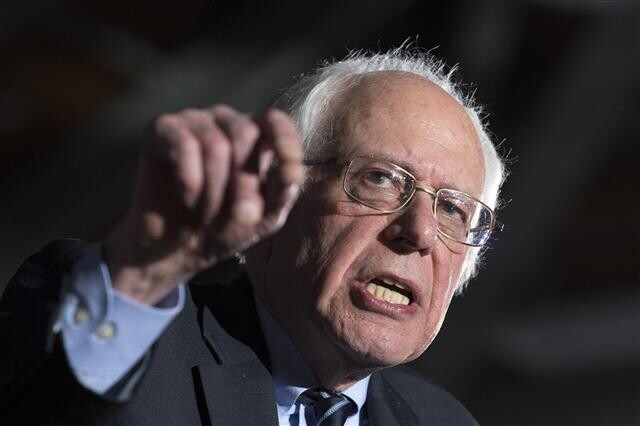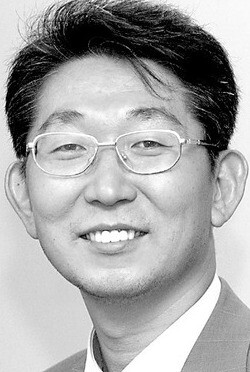hankyoreh
Links to other country sites 다른 나라 사이트 링크
[Column] Where is South Korea’s Bernie Sanders?

With another election approaching in South Korea, no captivating candidate like Sanders has yet emerged
The phenomenon of Democratic Senator Bernie Sanders is heating up the US presidential race. He has risen from an outsider with 5% support to a major force that sheds light on the future of the US.
The Sanders phenomenon is fuelled by voters’ disgust with vested interests and establishment politics, many pundits say. A prime reason for this disgust is thought to be the severe polarization in the US, in which the top 1% of the population make more money than the lower 50% altogether.
“Polarization has intensified under the reign of neo-liberalism in the nearly four decades since Reagan, and the American people are sick and tired of it,” said Jeong Hui-yong, director of the Institute for Opening Up a New Society, referring to welfare cuts during this period.
Sanders’ campaign pledges – providing universal health insurance, making university tuition free, heavily taxing those with high income from securities, doubling the minimum wage and taxing the wealth of the top 1% - can be summarized as two ideas: supporting the vulnerable sectors of society below the middle class and increasing the social responsibility of the wealthy to help accomplish this.
Leading US newspapers such as the Wall Street Journal are bashing Sanders for making promises that would have an astronomical cost if actually implemented, but they have not been able to stop him.
The US government lavished vast sums of taxpayers’ money on saving the big investment banks during the financial crisis in 2008. But the gap between the haves and have nots just increased and the banks were as immoral as ever, triggering the Occupy Wall Street demonstrations in 2011. Sanders argues that the government could raise a considerable amount of money by taking back the handouts it gave to the banks.
Sanders’ campaign pledges are not unfamiliar to South Koreans. Quite a few of these pledges – or ones similar to them – are already being made.
In an address in the National Assembly on Feb. 17, the opposition Minjoo Party of Korea repeated a proposal to raise the minimum wage to 10,000 won (US$8.10). Given that the minimum wage in South Korea this year is 6,030 won, Sanders’ pledge to double the minimum wage is more radical than the Minjoo Party’s.
The party’s plan to raise the corporate tax rate to 25% is also similar to Sanders’ idea of raising taxes on the wealthy. The corporate tax rate in South Korea was lowered to 22% as part of the tax cuts under former President Lee Myung-bak (2008-2013).
In South Korea, policies similar to those proposed by Sanders have been attacked as being populist, anti-market and anti-corporate. In the vanguard of such attacks have been the vested interests and the conservative party and media that speak for those interests. But considering that South Korea is facing polarization no less serious than that in the US, such attacks are unlikely to earn support from the public.
Furthermore, there is soaring mistrust of establishment politics among voters. Despite this, during two presidential elections and two parliamentary elections over the past eight years, South Korean voters have chosen the same conservative party each time.
No small number of pundits believe that the fundamental difference between South Korea and the US on this point is that South Korea lacks a trustworthy political leader like Bernie Sanders. Sanders was elected mayor of Burlington, a city in Vermont, in 1981, where he served for four terms. After that, he represented Vermont in the US House of Representatives for eight terms and in the US Senate for two terms.
During a political career spanning nearly 40 years, Sanders has described himself as a democratic socialist, spoken on behalf of the middle class, the poor, workers and minorities and criticized big money and establishment politics while always staying true to his principles.

Some of the many reforms that he spearheaded as mayor were buying up houses from multiple home owners and renting them out to working-class families for an affordable price, preventing big box stores from opening downtown, establishing consumer cooperatives to protect mom and pop stores and setting up an arts council answerable to him that provided free concerts and other artistic and cultural events. By relying on grassroots progressive politics, Sanders turned Burlington, a city of 40,000 people, into the most livable city in the US.
Sanders’ honesty and his successful leadership were what set him apart from politicians who are all talk; they are what launched him into the front row of presidential hopefuls.
While a number of politicians from both sides of the aisle are being discussed as likely candidates in South Korea’s own presidential campaign, coming up in 2017, there seems to be no one in sight with the leadership and the results of Sanders.
If someone like Bernie Sanders actually showed up in South Korea, who knows what might happen?
By Kwak Jung-soo, business correspondent
Please direct questions or comments to [english@hani.co.kr]

Editorial・opinion
![[Column] Park Geun-hye déjà vu in Yoon Suk-yeol [Column] Park Geun-hye déjà vu in Yoon Suk-yeol](https://flexible.img.hani.co.kr/flexible/normal/500/300/imgdb/original/2024/0424/651713945113788.jpg) [Column] Park Geun-hye déjà vu in Yoon Suk-yeol
[Column] Park Geun-hye déjà vu in Yoon Suk-yeol![[Editorial] New weight of N. Korea’s nuclear threats makes dialogue all the more urgent [Editorial] New weight of N. Korea’s nuclear threats makes dialogue all the more urgent](https://flexible.img.hani.co.kr/flexible/normal/500/300/imgdb/original/2024/0424/7317139454662664.jpg) [Editorial] New weight of N. Korea’s nuclear threats makes dialogue all the more urgent
[Editorial] New weight of N. Korea’s nuclear threats makes dialogue all the more urgent- [Guest essay] The real reason Korea’s new right wants to dub Rhee a founding father
- [Column] ‘Choson’: Is it time we start referring to N. Korea in its own terms?
- [Editorial] Japan’s rewriting of history with Korea has gone too far
- [Column] The president’s questionable capacity for dialogue
- [Column] Are chaebol firms just pizza pies for families to divvy up as they please?
- [Column] Has Korea, too, crossed the Rubicon on China?
- [Correspondent’s column] In Japan’s alliance with US, echoes of its past alliances with UK
- [Editorial] Does Yoon think the Korean public is wrong?
Most viewed articles
- 1[Column] Park Geun-hye déjà vu in Yoon Suk-yeol
- 2Thursday to mark start of resignations by senior doctors amid standoff with government
- 3Kim Jong-un expressed ‘satisfaction’ with nuclear counterstrike drill directed at South
- 4[Column] ‘Choson’: Is it time we start referring to N. Korea in its own terms?
- 5N. Korean hackers breached 10 defense contractors in South for months, police say
- 6Will NewJeans end up collateral damage in internal feud at K-pop juggernaut Hybe?
- 7Why Korea shouldn’t welcome Japan’s newly beefed up defense cooperation with US
- 8[Editorial] New weight of N. Korea’s nuclear threats makes dialogue all the more urgent
- 9[Guest essay] The real reason Korea’s new right wants to dub Rhee a founding father
- 10[Column] Yoon’s first 100 days should open our eyes to pitfalls of presidential system